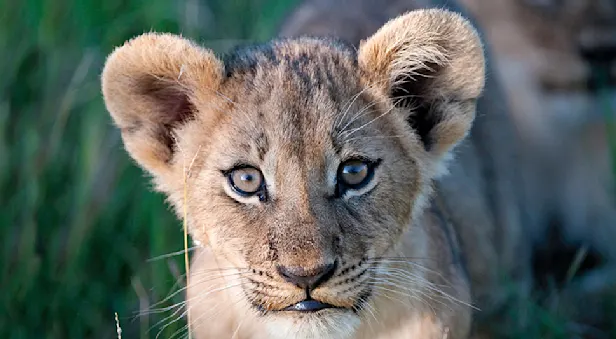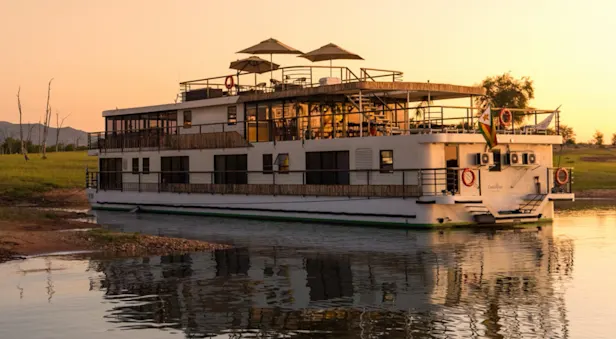Hippo Facts | Southern Africa Wildlife Guide
Physical Characteristics
The second-largest terrestrial mammal, weighing up to 4,400 pounds.
Barrel-shaped bodies and short legs.
Their heads are well adapted for life in the water, with eyes, ears and nose all situated on the upper half.
A hippo can stretch its jaws 150 degrees wide, which is a remarkable scene, particularly when one emerges from murky waters to face a challenge.
Habitat
Hippos are found in deep bodies of water and slow-moving rivers among grasslands with shallow-sided banks. They prefer a water temperature of 64° to 95° Fahrenheit, and they have even been seen along the seacoast. In fact, in the 1920s, a famous hippo swam all the way along the coast of South Africa from Zululand to the Eastern Cape—a distance of nearly 800 miles! They are found everywhere in Africa where there is sufficient water, and even where the water dries up at certain times of the year. During the rainy season, males sometimes take up temporary residence in seasonal water holes that are located up to 40 miles inland from permanent water sites.
Behavior
Hippos spend the majority of their time partially or completely submerged in water, resurfacing to breathe every three to five minutes. Dives generally last less than five minutes, but have been known to take as long as 15. Hippos generally come out of the water only at night to feed on the shore. However, where there is very little stress on the animals, they will also emerge and “sunbathe” on riverbanks. In some areas, it is not uncommon to see 30 to 40 hippos all sleeping on such a bank—and one can easily see where the collective description, a “pod” of hippos, originates.
Hippos produce a variety of vocalizations, among them the dominant male’s “MUH-Muh-muh,” bellows and roars when fighting, a high-pitched “neighing” when attacked and a sort of snort when submerged. Legends abound about these animals. Bushmen say that the reason the hippos submerge at once and all come up at once to do their “MUH-Muh-muh” call is because they are telling funny stories under water!
Humans are the hippo’s only real threat, although a pride of lions will attack a solitary hippo on land, and crocodiles undoubtedly take the occasional baby hippo in the water. When attacked, however, females will try to defend their young by making use of their long tusks (canines).
Hippo Society
Hippos are gregarious and territorial. Group size averages 10 to 15 females with young, led by one dominant male. When water resources become scarce during droughts, groups of 150 have been observed. Dominant males space themselves out along the lake shore or river course, advertising their dominance with the familiar “MUH-Muh-muh” call. Sexually mature males are kept on the edges of the group by threats and fights until, at eight to 10 years old, they feel strong enough to take on a territory holder. As the flow of rivers changes with seasons, territories can break down. In more stable lakes, territories may remain constant for years.
Hippos have a curious habit of spraying their dung around a two-meter radius by rapidly whirling their stubby tails as they defecate. This is done simply to show exactly where their boundaries stand, as they are fiercely territorial, both in the water and on land. Hippos have even been known to kill each other for dominance.
Feeding Habits
Hippos are grazers and feed at night, coming out of the water along well-worn trails; it is a misconception that they feed off weeds growing at the bottom of water sources. During the rainy season, when grass is abundant, they feed near the shore. Their two-foot wide lips allow them to eat very short grass. In the dry season, they may walk up to six miles inland in search of food.
As is the case with elephants and zebras, hippos also possess only one stomach. They are non- ruminants, however the total amount of food taken by an adult hippo is less than that ingested by other non-ruminants—only one to 1.5 percent compared with 2.5 percent of total body weight. This is only possible because of the hippo’s undemanding lifestyle—floating around the pool all day does not take much effort!
Breeding
Both courtship and mating occur in the water. In theory, territorial males have exclusive mating rights, but in reality, they are continually challenged by other males. Fights are common, leaving animals visibly scarred along their back and flanks. Females give birth in shallow water, and suckling occurs on land or in ankle-deep water, lasting for eight months.
See Hippos on These African Safaris

Botswana: Kalahari, the Delta & Beyond
Witness the spectacle of Botswana during the green season under changing skies, as the desert bursts forth with life, wildlife thrives with seasonal water, and new births fill the plains.
































